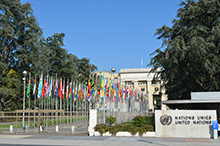The first Unit is devoted to the global framework and initiatives in the governance of migration as emerging at the end of the millennium in the aftermath of the Berne Initiative launched to develop an international policy framework on migration. In this context, the EU free movement of persons will be addressed an inspiring practice, recently challenged. The following unit focuses on the international framework of refugee and IDP protection and its institutions, with a focus on recent developments in Switzerland, the Middle East and Europe. The next section 3 looks at the recent shift in research from a policy oriented to a more migrant informed perspective of decision making in migration, which gives new insights into the migration processes. Implications of border controls, visa policies and cross border services are analysed in unit 4 as a particularly sensitive issue of smuggling and human trafficking, which are often on purpose confused in public debates.
The underlying processes highlight the particular vulnerability of various categories of migrants devoid of legal, financial and human resources (indigent refugees or other migrants, women, unaccompanied minors, etc.). Therefore, unit 5 investigates the underlying factors and structures that create unequal power relations and dependency, how migration management regimes of control and enforcement are practiced and how they shape individual irregular migrants’ experiences in diverse ways. On the side of policy responses, the so-called durable solutions – local integration, return, resettlement – are addressed with particular interest being paid to the reactivation of resettlement regimes in Switzerland and EU countries (unit 6). We also look at the relocation of refugees in Greece and Italy to other EU countries. Finally, we focus on the sub-state level and show the implications migration has on the regional and local level (unit 7). In particular, we analyse the challenges faced by minority regions, where new diversity stemming from migration encounters historical linguistic, religious and cultural diversity.
Topics
-
Towards global governance of migration;
- While trade, finance and knowledge are ruled through global codes of conduct, human migration still lacks binding rules, in spite of renewed debates on a global compact for safe and regular migration. They follow earlier initiatives for a global multilateral framework on migration.
-
International governance of refugee and IDPs;
- With the legal and institutional framework for refugee protection (Geneva 1951 Convention, OAU Convention and other sub-regional frame works) a set of practices for the protection of refugees and IDPs has emerged. Main actors are identified and issues at the interface between refugee and immigration addressed.
-
Determinants of (refugee) migration movements;
- This unit focuses on the agency of refugees and migrants as well as on the socio-economic and cultural determinants of the migration process and decision making about the choice of destinations. It scrutinizes the binary forced-versus-voluntary-migration approach towards a continuum of migrant agency, mitigated by socio-cultural and economic determinants.
-
From migrant smuggling to trafficking in persons;
- Another continuum between migrant smuggling and human trafficking is analysed in the light of its policy implications when it comes to border control and legal migration possibilities, with regard to recent developments in the Mediterranean.
-
Vulnerability and migration;
- In this unit we focus on the concept of structural vulnerability to understand and explain irregular migrants’ experiences by looking into the factors and structures underpinning their difficulties in accessing basic necessities such as healthcare, work, and shelter. Structural vulnerability also is used to reveal the role of state policies, legislation, and practices in creating irregular migrants’ subordination and dependency.
-
International refugee resettlement and relocation in within the EU;
- Current perspectives of durable solutions – versus temporary protection in camps or urban contexts – are analysed with a focus on reactivation of resettlement in the EU and Switzerland.
-
Migration to and within minority territories.
- This unit discusses immigrant integration as well as the accommodation of refugees at the regional and local level. Minority nations constitute a particular case study to show the interlinkages between new diversity stemming from migration, and old diversity stemming from the re-drawing of the borders (e.g. Europe) and unresolved claims for nationhood.



